The first lines of novels can, understandably, be stressful for writers. We often feel pressure to start with a bang, or beauty, or unparalleled genius. That’s a lot to ask of a few words. But do the best novels always have such exceptional openings? And what techniques can make opening lines impactful?
In this article, we’ll look at the famous first lines of great novels, picking out memorable and celebrated openings. You might notice that some are deceptively simple!
Hopefully, these examples will provide not only inspiration but also reassurance. Sometimes, the only thing the first line of a novel really needs to do is start your story—for more guidance on your opening, make sure you check out our full guide. Better still, sign up for one of our creative writing courses so you can get in-depth guidance and daily lessons created by a Booker Prize-listed author. You’ll also have access to your own personal writing coach and a professional editor who can make your opening—and the rest of your story—sparkle. This is almost always the section that will determine whether you secure literary agent representation and a publishing deal further down the line. You want savvy professionals with years of experience in the industry to help you put your best foot forward!
Get your story straight from the start
Make sure your opening line delivers on the promise of a satisfying storyline. Our five-step Novel Kickstarter Course begins with a one-on-one book coaching session with a bestselling author so you can write on with confidence, knowing you’re onto a winner.
Don’t put too much pressure on your first line
Although your opening sentence is really important, putting lots of pressure on your first line is generally counterproductive. As you set about writing or even editing your novel, try not to get too worried about how you begin.
Remember, you can revisit your opening line many times as you get to know your plot, setting, and characters!
On top of that, openings don’t need to be genius; they need to be assured, calm, and steady. You want to put your reader at ease and into safe hands, and the best way to do that is to resist showing off. Simply tell us where we are and who is there, and move gently onto what’s at stake.
And if this is your first draft, take your time. You’ll get to build up your main character later. For now, you’re still getting to know each other, so indulge yourself. Yes, indulge yourself. This story’s for you!
Beyond the first line
Before we dive into the minutiae and our best examples of brilliant first lines, we can afford to think a little bit about what will follow. What makes a great opening, more broadly speaking?
Again, we have lots of advice on this in our guide to starting a story, and in this article containing insights from a literary agent on openings that find success. But here’s some guidance to get you started: tell us what your main character wants. Then, tell us more about the problem—what stops them from getting it? What’s the source of their frustration?
Breathe and take your time to look around a scene or setting just as your character might. What are they interested in? What do they need to see? What do they want?
For now, take the pressure off. Enjoy these examples of the best opening lines, and just put pen to paper.
The first lines of novels are shaped by many factors
The sentence you choose to start off your novel will probably be influenced by several factors. What are the main themes of your novel? What is the inciting incident in your story? Who is telling that story? What form are you telling it in?
In our examples, we’ll see how factors like these might have influenced the opening line each author has chosen for their novel.
First lines of novels whose agent of change is a person, and the narrator an outside observer
In my younger and more vulnerable years my father gave me some advice that I’ve been turning over in my mind ever since.
—F. Scott Fitzgerald, The Great Gatsby
Elmer Gantry was drunk.
—Sinclair Lewis, Elmer Gantry
I first met Dean not long after my wife and I split up.
—Jack Kerouac, On The Road
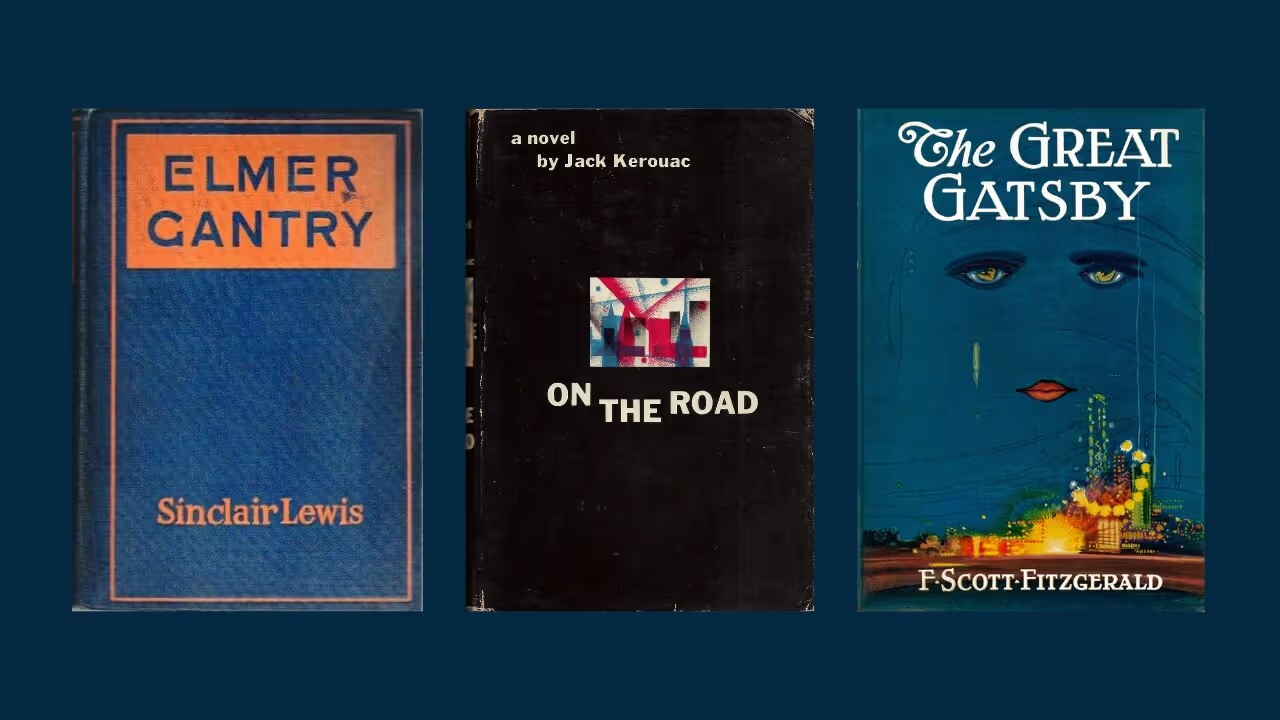
First lines of novels whose agent of change is the narrator
You don’t know about me, without you have read a book by the name of The Adventures of Tom Sawyer, but that ain’t no matter. That book was made by a Mr. Mark Twain, and he told the truth, mainly.
—Mark Twain, The Adventures of Huckleberry Finn
If you really want to hear about it, the first thing you’ll probably want to know is where I was born, and what my lousy childhood was like, and how my parents were occupied and all before they had me, and all that David Copperfield kind of crap, but I don’t feel like going into it, if you want to know the truth.
—J.D. Salinger, The Catcher in the Rye
If I am out of my mind, it’s all right with me, thought Moses Herzog.
—Saul Bellow, Herzog
All this happened, more or less.
—Kurt Vonnegut, Slaughterhouse-Five
The first thing I remember is being under something.
—Charles Bukowski, Ham on Rye
I suppose that’s exactly the problem—I wasn’t raised to know any better.
—Paul Beatty, The Sellout
I am a sick man... I am a spiteful man. I am an unattractive man. I think my liver is diseased.
—Fyodor Dostoyevsky, Notes From Underground
Of course, I have not always been a drunkard.
—Hans Fallada, The Drinker
I have never begun a novel with more misgiving.
—Somerset Maugham, The Razor’s Edge
First the colors. Then the humans. That’s usually how I see things. Or at least, how I try.
—Markus Zusak, The Book Thief
It was inevitable: the scent of bitter almonds always reminded him of the fate of unrequited love.
—Gabriel García Márquez, Love in the Time of Cholera
I write this sitting in the kitchen sink.
—Dodie Smith, I Capture the Castle
It was a queer, sultry summer, the summer they electrocuted the Rosenbergs, and I didn’t know what I was doing in New York.
—Sylvia Plath, The Bell Jar
And, above all, a line that can never be repeated, sadly, because he owns it...
This is the saddest story I have ever heard.
—Ford Madox Ford, The Good Soldier
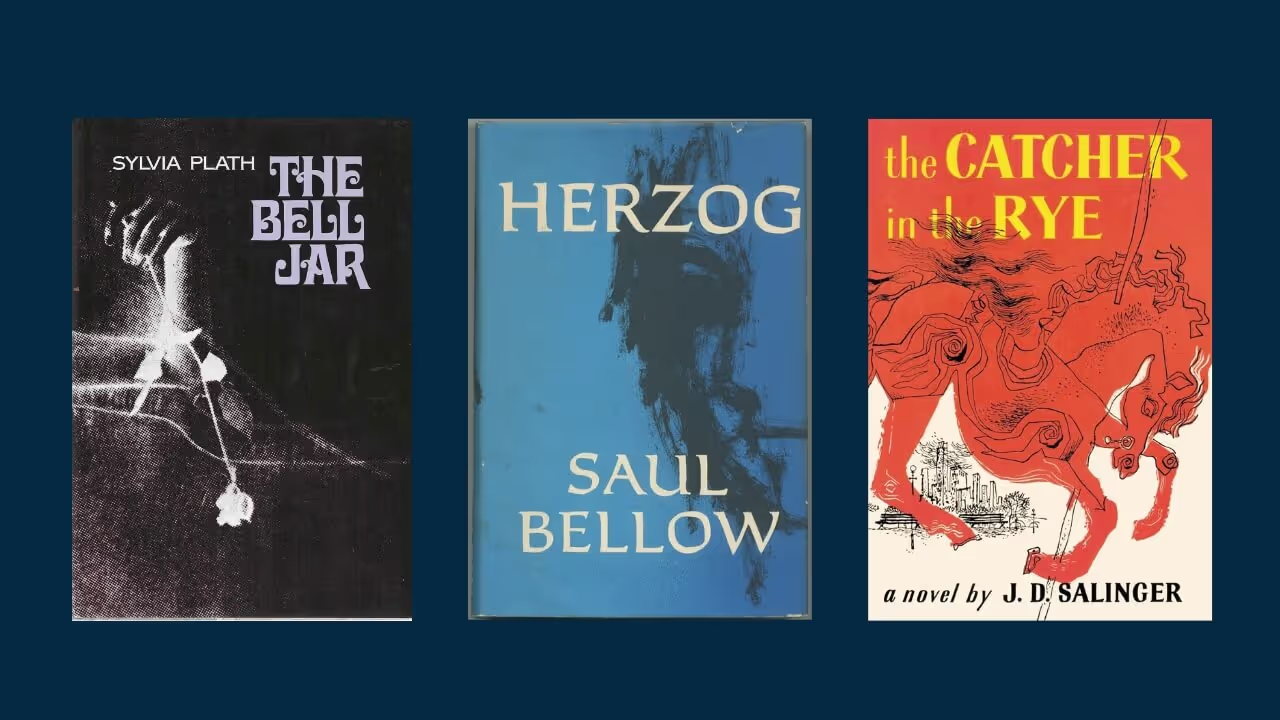
If we have a ‘situation’ and a cast set piece
It was love at first sight.
—Joseph Heller, Catch-22
In the late summer of that year we lived in a house in a village that looked across the river and the plain to the mountains.
—Ernest Hemingway, A Farewell to Arms
First lines of historical and/or allegorical novels
You might notice that these novels often begin in media res to pique the reader’s interest.
It was a wrong number that started it, the telephone ringing three times in the dead of night, and the voice on the other end asking for someone he was not.
—Paul Auster, City of Glass
He speaks in your voice, American, and there’s a shine in his eyes that’s halfway hopeful.
—Don DeLillo, Underworld
It began the usual way, in the bathroom of the Lassimo Hotel.
—Jennifer Egan, A Visit From the Goon Squad
Granted: I am an inmate of a mental hospital; my keeper is watching me, he never lets me out of his sight; there’s a peephole in the door, and my keeper’s eye is the shade of brown that can never see through a blue-eyed type like me.
—Günter Grass, The Tin Drum
As Gregor Samsa awoke one morning from uneasy dreams, he found himself transformed in his bed into a monstrous vermin.
—Franz Kafka, The Metamorphosis
The amber light came on.
—José Saramago, Blindness
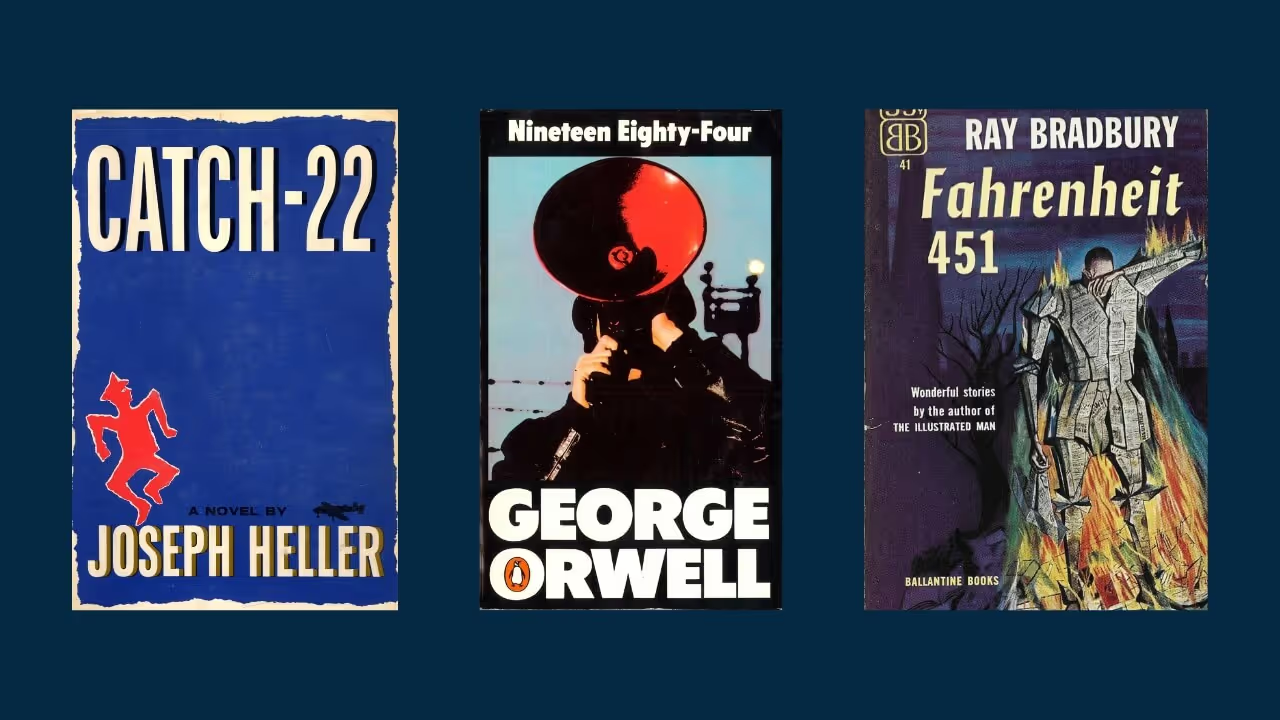
First lines of novels that sound a warning of what’s to come
There’s nothing to say you can’t start your story with the ‘after,’ and then take us to the ‘before’ and show us how your characters ended up there!
It was good enough for Gabriel García Márquez:
Many years later, as he faced the firing squad, Colonel Aureliano Buendía was to remember that distant afternoon when his father took him to discover ice.
—Gabriel García Márquez, One Hundred Years of Solitude
Oddball first lines that work well for fantasy and sci-fi
If you’re looking to build a brave new world (excuse us) for your readers, let them know just how different it is from the outset.
It was a bright cold day in April, and the clocks were striking thirteen.
—George Orwell, 1984
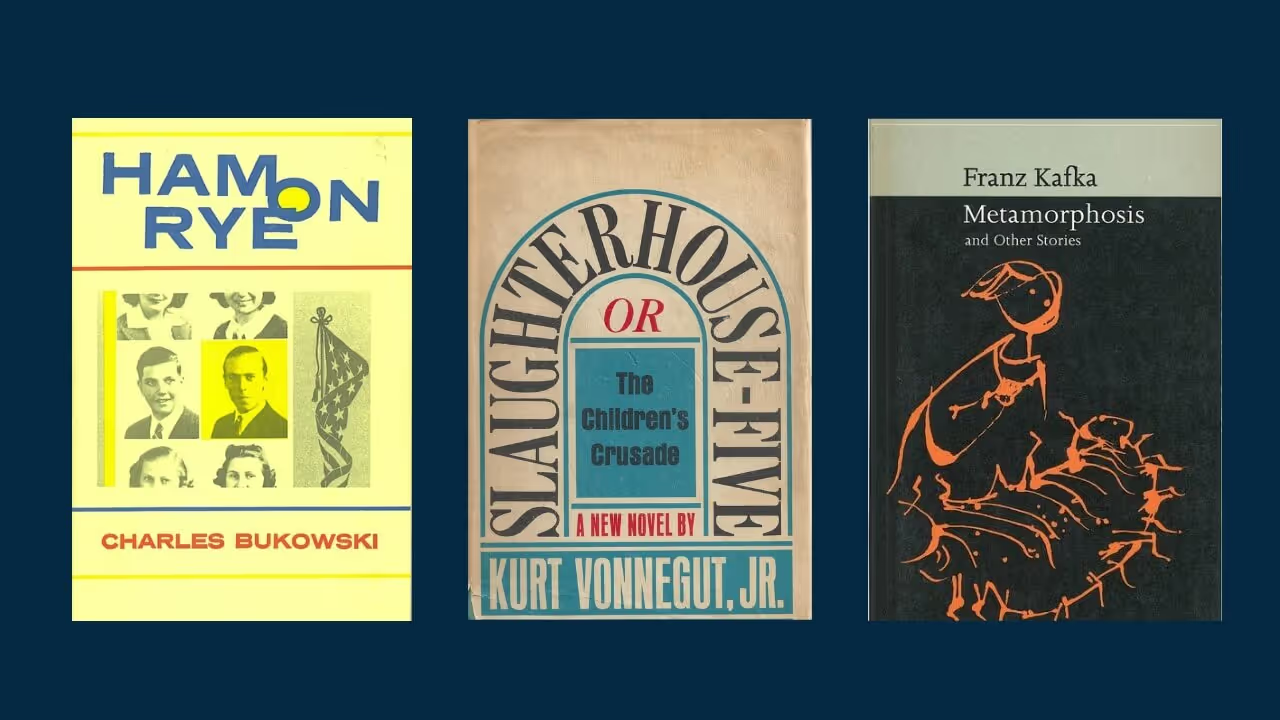
First lines that cut to the moral dilemma
Another powerful way to tackle the first line is to expose the novel’s dilemma right away. You might even imply what readers likely suspect: that this is going to change.
For a man of his age, 52, divorced, he has, to his mind, solved the problem of sex rather well.
—J.M. Coetzee, Disgrace
Ships at a distance have every man’s wish on board. For some they come in with the tide. For others they sail forever on the horizon, never out of sight, never landing until the Watcher turns his eyes away in resignation, his dreams mocked to death by Time. That is the life of men.
Now, women forget all those things they don’t want to remember, and remember everything they don’t want to forget. The dream is the truth. Then they act and do things accordingly.
—Zora Neale Hurston, Their Eyes Were Watching God
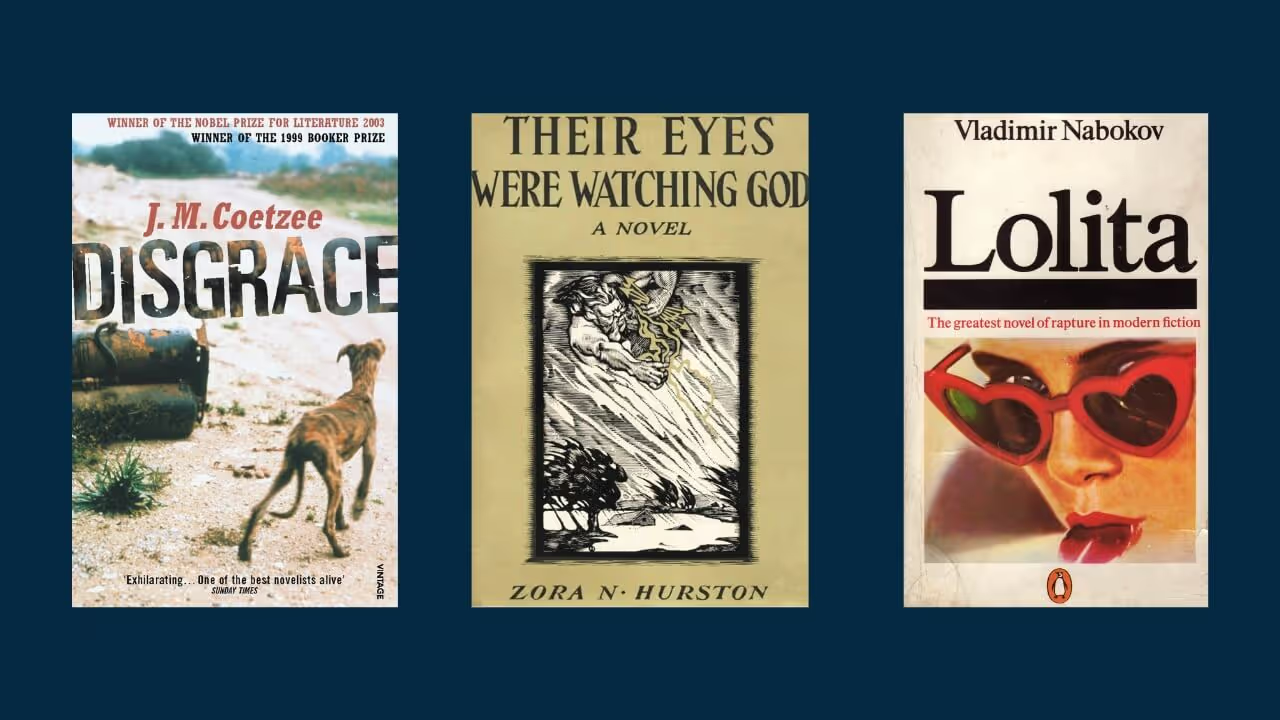
Short first lines of famous novels
Call me Ishmael.
—Herman Melville, Moby Dick
Lolita, light of my life, fire of my loins.
—Vladimir Nabokov, Lolita
All this happened, more or less.
—Kurt Vonnegut, Slaughterhouse-Five
I am an invisible man.
—Ralph Ellison, Invisible Man
A screaming comes across the sky.
—Thomas Pynchon, Gravity’s Rainbow
It was a pleasure to burn.
—Ray Bradbury, Fahrenheit 451
With a short first line, the reader enters the world you’ve created without delay. It can also lend a sense of authorial confidence and authority that places the reader in safe hands, and helps them relax into the story.
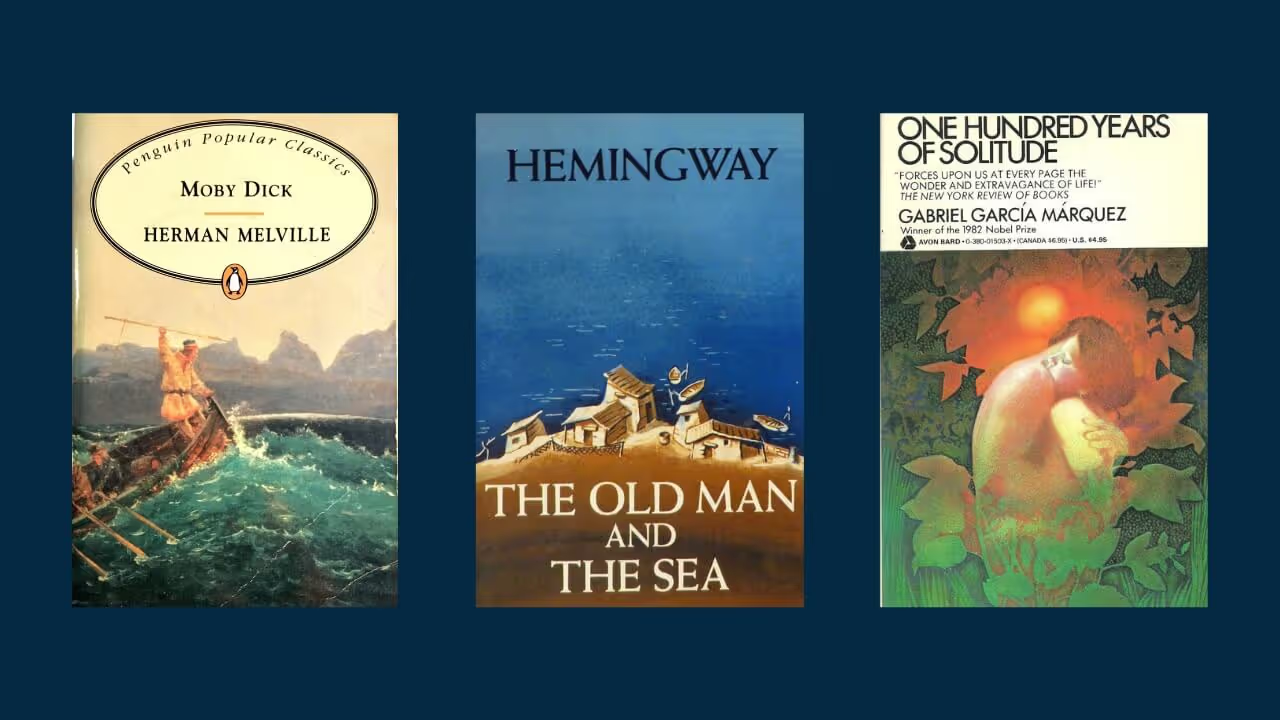
Don’t worry too much about the first line of your novel
It’s not until the end of the novel-writing process that most people nail their first line. If you want some extra support, remember that we cover this process in our creative writing courses.
It’s likely that you won’t find the perfect first line for your novel until you’ve worked through the hook (your one-line premise for your story) and your synopsis a few times, and got to grips with your theme. All of this may well happen in the second draft or beyond.
In fact, before you think about perfecting the first line of your novel, why not polish up the first chapter? It might help you find the perfect way to crack your story open! And for extra inspiration, read the excellent advice on first chapters that literary agent Marilia Savvides offered us, and our guide on how to start a story.
{{blog-banner-10="/blog-banners"}}
The Top 20 opening sentences of novels
Take a look at the first 20 openings chosen in American Book Review’s 100 Best First Lines From Novels if you’re looking for further inspiration and more examples of literary greatness, some of which may seem familiar!
- ‘Call me Ishmael.’—Herman Melville, Moby-Dick (1851)
- ‘It is a truth universally acknowledged, that a single man in possession of a good fortune, must be in want of a wife.’—Jane Austen, Pride and Prejudice (1813)
- ‘A screaming comes across the sky.’—Thomas Pynchon, Gravity’s Rainbow (1973)
- ‘Many years later, as he faced the firing squad, Colonel Aureliano Buendía was to remember that distant afternoon when his father took him to discover ice.’—Gabriel García Márquez, One Hundred Years of Solitude (1967; trans. Gregory Rabassa)
- ‘Lolita, light of my life, fire of my loins.’—Vladimir Nabokov, Lolita (1955)
- ‘Happy families are all alike; every unhappy family is unhappy in its own way.’—Leo Tolstoy, Anna Karenina (1877; trans. Constance Garnett)
- ‘Riverrun, past Eve and Adam’s, from swerve of shore to bend of bay, brings us by a commodius vicus of recirculation back to Howth Castle and Environs.’—James Joyce, Finnegans Wake (1939)
- ‘It was a bright cold day in April, and the clocks were striking thirteen.’—George Orwell, 1984 (1949)
- ‘It was the best of times, it was the worst of times, it was the age of wisdom, it was the age of foolishness, it was the epoch of belief, it was the epoch of incredulity, it was the season of Light, it was the season of Darkness, it was the spring of hope, it was the winter of despair.’—Charles Dickens, A Tale of Two Cities (1859)
- ‘I am an invisible man.’—Ralph Ellison, Invisible Man (1952)
- ‘The Miss Lonelyhearts of the New York Post-Dispatch (Are you in trouble?—Do-you-need-advice?—Write-to-Miss-Lonelyhearts-and-she-will-help-you) sat at his desk and stared at a piece of white cardboard.’—Nathanael West, Miss Lonelyhearts (1933)
- ‘You don’t know about me without you have read a book by the name of The Adventures of Tom Sawyer; but that ain’t no matter.’—Mark Twain, Adventures of Huckleberry Finn (1885)
- ‘Someone must have slandered Josef K., for one morning, without having done anything truly wrong, he was arrested.’—Franz Kafka, The Trial (1925; trans. Breon Mitchell)
- ‘You are about to begin reading Italo Calvino’s new novel, If on a winter’s night a traveler.’—Italo Calvino, If on a winter’s night a traveler (1979; trans. William Weaver)
- ‘The sun shone, having no alternative, on the nothing new.’—Samuel Beckett, Murphy (1938)
- ‘If you really want to hear about it, the first thing you’ll probably want to know is where I was born, and what my lousy childhood was like, and how my parents were occupied and all before they had me, and all that David Copperfield kind of crap, but I don’t feel like going into it, if you want to know the truth.’—J.D. Salinger, The Catcher in the Rye (1951)
- ‘Once upon a time and a very good time it was there was a moocow coming down along the road and this moocow that was coming down along the road met a nicens little boy named baby tuckoo.’—James Joyce, A Portrait of the Artist as a Young Man (1916)
- ‘This is the saddest story I have ever heard.’—Ford Madox Ford, The Good Soldier (1915)
- ‘I wish either my father or my mother, or indeed both of them, as they were in duty both equally bound to it, had minded what they were about when they begot me; had they duly considered how much depended upon what they were then doing;—that not only the production of a rational Being was concerned in it, but that possibly the happy formation and temperature of his body, perhaps his genius and the very cast of his mind;—and, for aught they knew to the contrary, even the fortunes of his whole house might take their turn from the humours and dispositions which were then uppermost:—Had they duly weighed and considered all this, and proceeded accordingly,—I am verily persuaded I should have made a quite different figure in the world, from that, in which the reader is likely to see me.’—Laurence Sterne, The Life and Opinions of Tristram Shandy, Gentleman (1759–67)
- ‘Whether I shall turn out to be the hero of my own life, or whether that station will be held by anybody else, these pages must show.’—Charles Dickens, David Copperfield (1850)
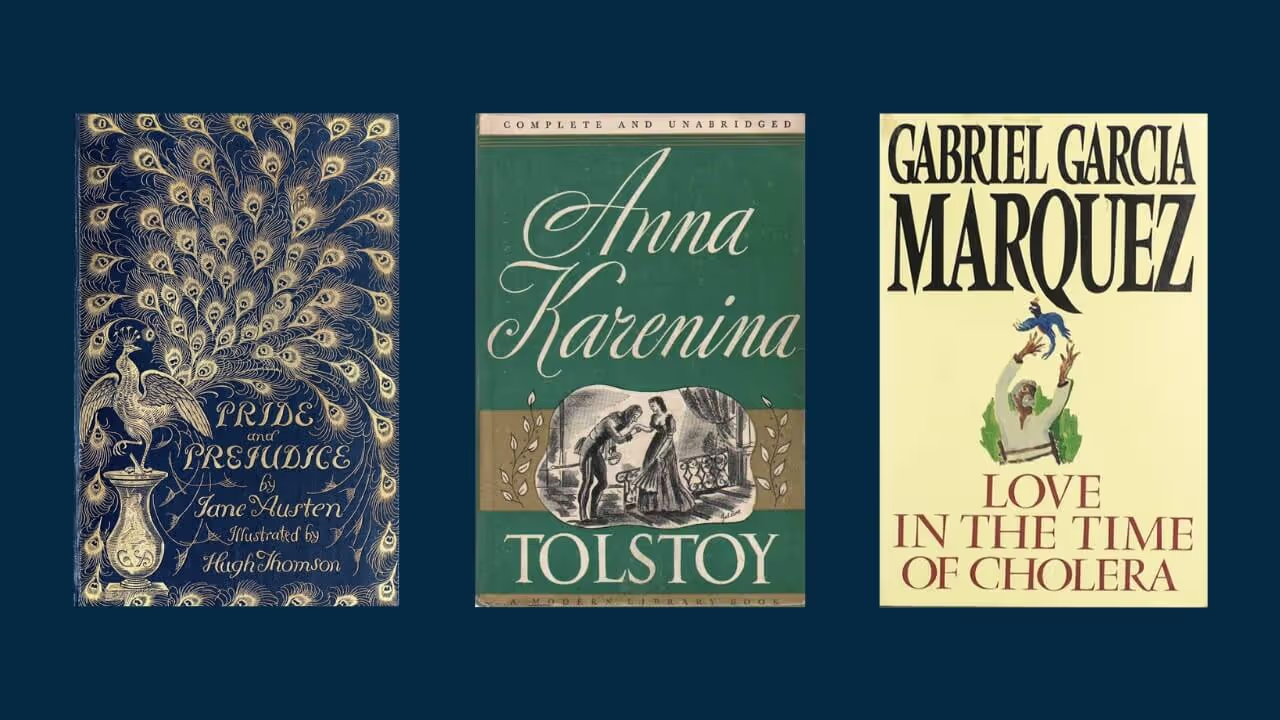
Other famous first (and second) lines
It was a dark and stormy night; the rain fell in torrents—except at occasional intervals, when it was checked by a violent gust of wind which swept up the streets (for it is in London that our scene lies), rattling along the housetops, and fiercely agitating the scanty flame of the lamps that struggled against the darkness.
—Edward Bulwer-Lytton, Paul Clifford
Here’s a first line you probably won’t want to emulate. It’s generally touted as the example of everything you shouldn’t do in a novel’s opening, and often quoted with fond derision. Even the Peanuts comics poked fun at it, having Snoopy write the ‘dark and stormy night’ line over and over and over again.
Francis Marion Tarwater’s uncle had been dead for only half a day when the boy got too drunk to finish digging his grave and a Negro named Buford Munson, who had come to get a jug filled, had to finish it and drag the body from the breakfast table where it was still sitting and bury it in a decent and Christian way, with the sign of its Savior at the head of the grave and enough dirt on top to keep the dogs from digging it up. Buford had come along about noon and when he left at sundown, the boy, Tarwater, had never returned from the still.
—Flannery O’Connor, The Violent Bear It Away
Mother died today. Or maybe yesterday; I can’t be sure.
—Albert Camus, The Stranger
‘When your mama was the geek, my dreamlets,’ Papa would say, ‘she made the nipping off of noggins such a crystal mystery that the hens themselves yearned toward her, waltzing around her, hypnotized with longing. “Spread your lips, sweet Lil,” they’d cluck, “and show us your choppers!”’
—Katherine Dunn, Geek Love
Somewhere in la Mancha, in a place whose name I do not care to remember, a gentleman lived not long ago, one of those who has a lance and ancient shield on a shelf and keeps a skinny nag and a greyhound for racing.
—Miguel de Cervantes, Don Quixote
One summer afternoon Mrs. Oedipa Maas came home from a Tupperware party whose hostess had put perhaps too much kirsch in the fondue to find that she, Oedipa, had been named executor, or she supposed executrix, of the estate of one Pierce Inverarity, a California real estate mogul who had once lost two million dollars in his spare time but still had assets numerous and tangled enough to make the job of sorting it all out more than honorary.
—Thomas Pynchon, The Crying of Lot 49
Ages ago, Alex, Allen and Alva arrived at Antibes, and Alva allowing all, allowing anyone, against Alex’s admonition, against Allen’s angry assertion: another African amusement... Anyhow, as all argued, an awesome African army assembled and arduously advanced against an African anthill, assiduously annihilating ant after ant, and afterward, Alex astonishingly accuses Albert as also accepting Africa’s antipodal ant annexation.
—Walter Abish, Alphabetical Africa
I will tell you in a few words who I am: lover of the hummingbird that darts to the flower beyond the rotted sill where my feet are propped; lover of bright needlepoint and the bright stitching fingers of humorless old ladies bent to their sweet and infamous designs; lover of parasols made from the same puffy stuff as a young girl’s underdrawers; still lover of that small naval boat which somehow survived the distressing years of my life between her decks or in her pilothouse; and also lover of poor dear black Sonny, my mess boy, fellow victim and confidant, and of my wife and child. But most of all, lover of my harmless and sanguine self.
—John Hawkes, Second Skin
Stately, plump Buck Mulligan came from the stairhead, bearing a bowl of lather on which a mirror and a razor lay crossed.
—James Joyce, Ulysses
Having placed in my mouth sufficient bread for three minutes’ chewing, I withdrew my powers of sensual perception and retired into the privacy of my mind, my eyes and face assuming a vacant and preoccupied expression.
—Flann O’Brien, At Swim-Two-Birds
I was born twice: first, as a baby girl, on a remarkably smogless Detroit day in January of 1960; and then again, as a teenage boy, in an emergency room near Petoskey, Michigan, in August of 1974.
—Jeffrey Eugenides, Middlesex
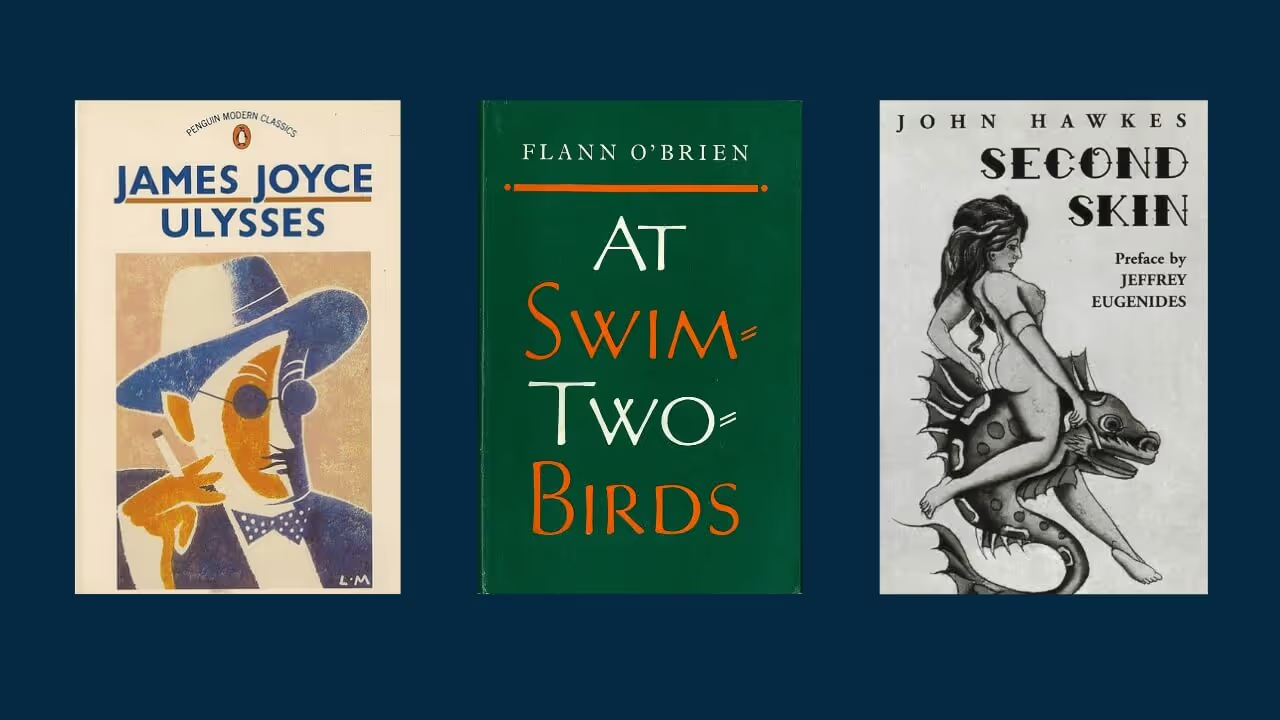
Welcome home, writers. Join us on the world’s best creative writing courses to create, write, and complete your book. Sign up and start today.
.avif)
.avif)

.avif)
.avif)
.avif)
